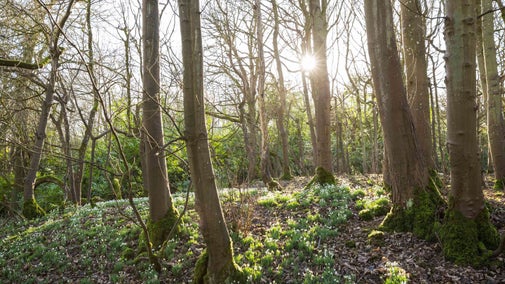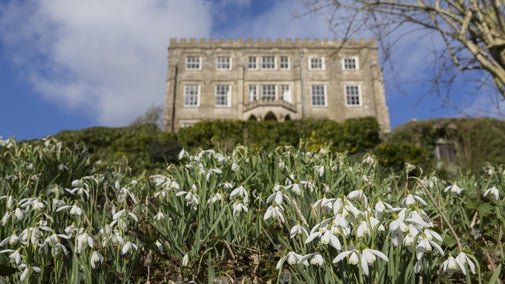
Discover more at Woodchester Park
Find out when Woodchester Park is open, how to get here, the things to see and do and more.

Situated in the heart of the Cotswolds, Woodchester Park boasts waymarked walking trails, limestone grasslands and lakes. A Site of Special Scientific Interest, its extraordinary variety of habitats provides an invaluable refuge to a wide variety of wildlife including birds, spawning fish and rare bats.
Summer is a great time to visit Woodchester Park but please don't be tempted to take a dip in the lakes. There are hidden dangers underneath the water, and no mobile phone coverage. Vehicular access is difficult; it might not be possible to get help in the event of an emergency.
Take in the far-reaching views across the Woodchester valley and over to the Stroud Commons from the newly opened Tinkley Gate entrace to Woodchester Park. Take a stroll around undulating grassland and peaceful glades where a host of wildlife can be seen - red kites, rabbits, deer and foxes can be spotted throughout the year, while wildflowers and leafy trees appear in the warmer months.
If you fancy a longer walk, a trail winds down the side of the wooded valley to bring you out alongside the kennels and lakes and joins the routes that loop around the park itself.
If you fancy a moment to rest and refuel after a walk, or simply to take a moment in nature and enjoy a drink, the cafe serves a range hot and cold drinks, light lunches, wood-fired pizzas, cakes, snacks and ice creams to choose from.
During early to mid-summer, you can see carp in the lakes at Woodchester Park thrashing and splashing as they start to spawn in the warmer water. This happens when the water temperature reaches 18–24 degrees centigrade – if conditions are right, they can spawn three or four times a year.
Carp are prolific breeders and can produce over one million eggs each time they spawn. In the spawning season, you can see the males chasing, harassing and bumping into the females.
Most eggs are eaten by predators including fish, birds and insect larva. However, their battle for survival doesn't end there. Once hatched, baby fish make for a tasty treat for other fish and birds, such as kingfishers and herons. Those that do make it through to the winter are often killed by the cold weather.

While you’re out and about visiting Woodchester Park, you might see the resident herd of belted Welsh black cattle mowing the meadow grasses.
By grazing the grassland, they create a range of heights in the sward, which helps to increase the diversity of wildflowers and insects. What’s more, they do so without the use of harmful pesticides.
Once they’re done, flies and beetles make a beeline for steaming cow pats. Following closely after the beetles come hungry bats.
Woodchester Park is a mecca for birds, and gentle birdsong hits you in surround-sound in the valley. Some birds, such as red kites, are purely passing through. Others, like herons and kingfishers find a home in Woodchester Park and a safe haven for breeding.
In 10 years, we’ve logged over 124 species of bird, among them willow warblers, garden warblers, a wood warbler, pied and spotted flycatchers, redwings and bramblings.
In spring, don’t be surprised if you spot some rather prehistoric-looking chicks high above the lake at the bottom of Woodchester Park. On an island perched in the Scots pines is a bumper heronry – it’s home to more than 10 heron nests.
The herons have been coming here for decades and seem to have found the perfect high-rise location. They usually turn up in February, and by April and May are fussing over their strange yet enchanting chicks.

Woodchester Park is a designated Site of Special Scientific Interest and has been the focus of some of the longest-running mammal studies in the world.
Swimming has a big impact on the peace and tranquillity of this special habitat. The herons, otters and bats that live by the lakes are susceptible to disturbance.
It's important that we look after this extraordinary habitat so that it can continue to be enjoyed long into the future.
A number of greater horseshoe bats, one of the rarest bat species in Britain, have made Woodchester Park their home. Lesser horseshoe bats can also be spotted flying over the woods.
The mansion at Woodchester is particularly special as it's home to the horseshoe bats’ summer maternity roost. This is the only breeding colony of greater horseshoe bats east of the River Severn.
The bats emerge at dusk to hunt insects, especially dung beetles in the cowpats left by the grazing cattle. We're careful to protect their roosts so they can continue to fly over the woods for many years to come.
Other bats that have made Woodchester their home include pipistrelle and the distinctive brown long-eared bat. On warm summer evenings, Daubentons can be seen flying over the lakes and ponds.
The boathouse brings back memories of lazy summer days and lavish boating picnics enjoyed by the Ducie family and their friends.
Built in the 19th century, it may have been designed by John Adey Repton, the architect son of the famous Georgian landscape designer Humphry Repton.
When the National Trust bought Woodchester Park in 1994, the boathouse was hidden by vegetation and the lakes were virtually enclosed by the conifer plantations around them. Detailed research revealed that the land around the lakes was fields.
The boathouse was repaired in 1996, when the roof was replaced, the porch rebuilt and the oriel window strengthened. A new letterbox was also put in, to give the resident bats an easy route out when they leave at dusk to hunt for insects over the lake.
In addition to the above, we're removing the conifer trees and re-establishing pasture around the lakes. But it takes a long time to undo the past.

Find out when Woodchester Park is open, how to get here, the things to see and do and more.
Discover why an unfinished Gothic mansion stands on what was once the epitome of a country gentleman’s playground and the treasures that lay hidden in the garden for years.

Discover how to have a dog-friendly visit to Woodchester Park, including where dogs must be kept on short leads and what facilities are available. Woodchester Park is a two pawprint rated place.

On the surface all may appear calm and tranquil, but behind the scenes we’ve been beavering away to return the park to its 19th century glory.

Plan a visit to one of the special countryside places in our care and discover the benefits of being in the great outdoors. Pack your walking boots and get ready to explore woodlands, valleys and rivers.

Explore some of the finest landscapes in our care on coastal paths, accessible trails, woodland walks and everything in between. Find the best places to walk near you.

There are plenty of things to do in Gloucestershire and the Cotswolds, from visiting historic gardens, to exploring houses and ancient sites amongst a patchwork of commons, woods and valleys. Start planning your visit for all the family to enjoy.
